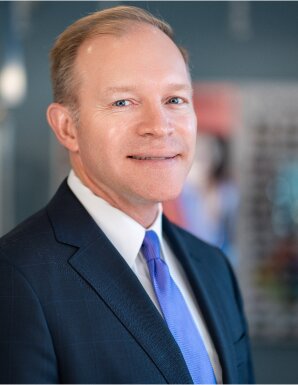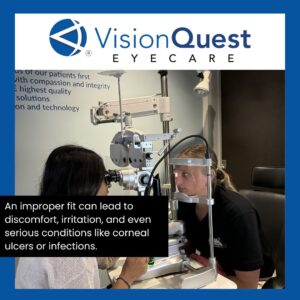When it comes to contact lenses, finding the right fit is essential for both comfort and eye health. While many people see contact lenses as a convenient alternative to glasses, achieving the perfect fit requires more than just selecting a lens brand. A specialized contact lens exam is needed to ensure that your lenses are comfortable, safe, and effective in providing clear vision. At VisionQuest Eyecare, with locations in Greenwood and Fishers, Indiana, we understand the importance of personalized eye care and strive to help you find the perfect contact lenses.
In this blog, we’ll cover why a contact lens exam is different from a regular eye exam, what to expect during your exam, and how to find the ideal fit near you.
Why Is a Contact Lens Exam Different from a Regular Eye Exam?
A standard comprehensive eye exam evaluates your overall eye health and determines if you need corrective lenses, but it does not include the specific measurements required for contact lenses. Contacts rest directly on the surface of your eye, so their fit needs to be precise to avoid discomfort or potential damage to your eye’s delicate tissues.
Here’s why a contact lens exam differs:
- Corneal Measurements: The shape and curvature of your cornea need to be carefully measured to ensure that the lens fits snugly on the eye. An improper fit can lead to discomfort, irritation, and even serious conditions like corneal ulcers or infections.
- Tear Film Evaluation: The quality and quantity of your tears are also assessed. Healthy tear production is essential for contact lens comfort and reducing the risk of dry eye problems.
- Lens Material and Size Selection: The doctor will recommend lenses based on your specific needs, including material, size, and even type (e.g., daily disposables, monthly wear, toric lenses for astigmatism, or multifocal lenses for presbyopia).
What Happens During a Contact Lens Exam?
At VisionQuest Eyecare, our contact lens exams are thorough and personalized to ensure the best possible outcome for every patient. Here’s what to expect during your visit:
1. Vision Evaluation
The exam begins with a standard eye test to determine your prescription for corrective lenses. Using tools like a phoropter, your optometrist will measure how well you can see at different distances. This part of the exam is similar to a regular eye exam.
2. Corneal Measurements
Next, the shape of your cornea will be mapped using a corneal topography device. This tool provides detailed images and measurements of your eye’s surface, helping your optometrist to select contact lenses that will fit your eye comfortably and provide optimal vision correction.
3. Tear Film Test
Your eye doctor will perform a tear film test to assess whether you produce enough tears to keep contact lenses comfortable throughout the day. If you have issues with dry eye, your optometrist will discuss solutions to make wearing contacts easier, such as specialized lenses or the use of eye drops.
4. Trial Lenses
You’ll likely be given a pair of trial lenses to wear for a short period during the appointment. This helps the optometrist evaluate how the lenses fit on your eye and whether they provide clear, comfortable vision. If any issues arise, adjustments can be made before you leave.
5. Lens Training
If you’re new to contact lenses, the staff at VisionQuest Eyecare will guide you through the process of inserting, removing, and caring for your lenses. Proper hygiene and care are essential to maintaining eye health and avoiding infections.
Types of Contact Lenses: Choosing the Right One

Choosing the best type of contact lenses depends on your lifestyle, vision needs, and eye health. During your exam, your eye doctor will discuss various options, helping you find the perfect match. Here are a few types of contact lenses we offer:
1. Soft Contact Lenses
Soft contact lenses are the most common type and are often recommended for their comfort. They are available in daily, weekly, or monthly disposables, giving patients flexibility based on their needs. These lenses are ideal for individuals with standard vision issues like nearsightedness or farsightedness.
2. Toric Lenses for Astigmatism
If you have astigmatism, toric lenses are designed to correct the irregular curvature of your eye. These lenses are specially shaped to provide clear vision at multiple angles.
3. Multifocal Lenses
For those with presbyopia, multifocal lenses provide vision correction for both near and far distances. These lenses are a great option for those over 40 who are experiencing age-related vision changes.
4. Rigid Gas Permeable (RGP) Lenses
RGP lenses are more durable and provide sharper vision than soft lenses, especially for individuals with specific eye conditions like keratoconus or high prescriptions. While they require a longer adjustment period, they offer superior breathability and may be better for long-term eye health.
5. Scleral Lenses
Scleral lenses are larger than traditional contacts and rest on the white part of the eye (the sclera). These lenses are often used for individuals with irregular corneas, severe dry eye, or conditions like keratoconus. They are highly specialized, providing excellent vision and comfort for those who need them.
Why Proper Contact Lens Fit Matters
Wearing poorly fitted contact lenses can lead to several eye health issues, including:
- Discomfort and Irritation: Lenses that are too tight or too loose can cause discomfort, itching, or redness.
- Infection Risk: Improper fit increases the likelihood of bacteria or debris getting trapped under the lens, which can lead to infections like keratitis.
- Corneal Damage: An ill-fitting lens can damage your cornea, leading to long-term vision problems or the need for medical treatment.
- Reduced Visual Acuity: Lenses that don’t align properly with your cornea may not correct your vision adequately, causing blurriness or eye strain.
Finding the Perfect Fit at VisionQuest Eyecare
At VisionQuest Eyecare, we understand that every patient’s eyes are unique. That’s why we offer customized contact lens fittings in both our Greenwood and Fishers locations. Whether you’re a first-time contact lens wearer or looking to switch from glasses to contacts, our experienced optometrists will guide you through the process with care and expertise.
Benefits of Choosing VisionQuest Eyecare for Your Contact Lens Exam:
- Comprehensive Eye Exams: We offer detailed exams that ensure every aspect of your eye health is covered.
- Personalized Lens Fitting: We take the time to assess your individual needs and find the best contact lenses for you.
- Advanced Technology: Our cutting-edge equipment allows us to measure your eyes with precision for a perfect fit.
- Patient Education: We provide training and tips on how to wear, remove, and care for your contact lenses to promote long-term eye health.
Schedule Your Contact Lens Exam Today
Don’t settle for discomfort or less-than-perfect vision. At VisionQuest Eyecare, our goal is to help you achieve clear, comfortable vision with the right contact lenses. If you’re in the Greenwood or Fishers, Indiana area, contact us today to schedule a comprehensive contact lens exam. We’ll work with you to find the ideal lenses that suit your lifestyle and vision needs.
Visit our website to book your appointment, and take the first step toward comfortable, crystal-clear vision with contact lenses.

Dr. Chris Browning is a Greenwood native, who has been serving the community through glaucoma care and myopia management. He studied at Indiana University Bloomington and the Indiana University School of Optometry. As he has severe nearsightedness himself, Dr. Browning is passionate about helping others to achieve excellent vision.


